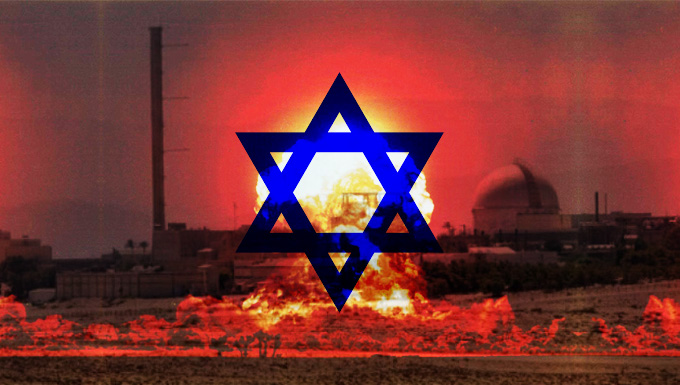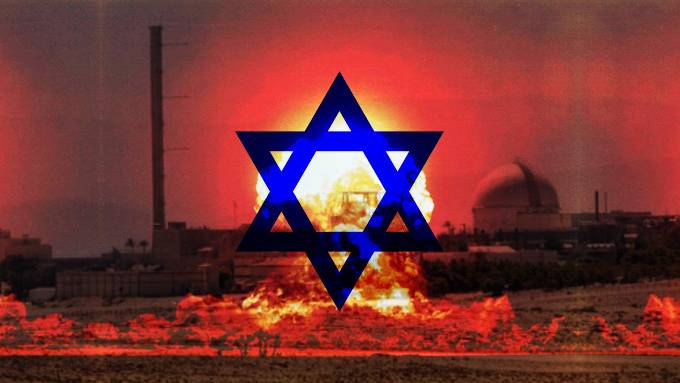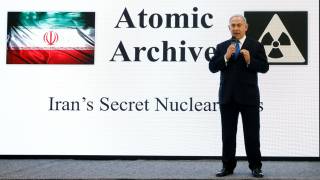Why is the U.S. okay with Israel having nuclear weapons but not Iran?
Source: washingtonpost.com

Iranian officials sometimes respond to accusations that Tehran is seeking a nuclear weapons capability by replying that, not only do they not want a bomb, they’d actually like to see a nuclear-weapons-free Middle East. Yes, this is surely in part a deflection, meant to shift attention away from concerns about Iran’s nuclear activities by not-so-subtly nodding to the one country in the region that does have nuclear weapons: Israel.
But could Iran have a point? Is there something hypocritical about the world tolerating Israel’s nuclear arsenal, which the country does not officially acknowledge but has been publicly known for decades, and yet punishing Iran with severe economic sanctions just for its suspected steps toward a weapons program? Even Saudi Arabia, which sees Iran as its implacable enemy and made its accommodations with Israel long ago, often joins Tehran’s calls for a "nuclear-free region." And anyone not closely versed in Middle East issues might naturally wonder why the United States would accept Israeli warheads but not an Iranian program.
"This issue comes up in every lecture I give," Joe Cirincione, president of the nuclear nonproliferation-focused Ploughshares Fund, told me. The suspicions that Israel gets special treatment because it’s Israel, and that Western countries are unfairly hard on Israel’s neighbors, tend to inform how many in the Middle East see the ongoing nuclear disputes. "It is impossible to give a nuclear policy talk in the Middle East without having the questions focus almost entirely on Israel," Cirincione said.
Of course, many Westerners would likely argue that Israel’s weapons are morally and historically defensible in a way that an Iranian program would not be, both because of Israel’s roots in the Holocaust and because it fought a series of defensive wars against its neighbors. "Israel has never given any reason to doubt its solely defensive nature," said Robert Satloff, executive director of the Washington Institute for Near East Policy, summarizing the American position. "Israel has never brandished its capabilities to exert regional influence, cow its adversaries or threaten its neighbors."
There’s truth to both of these perspectives. But the story of the Israeli nuclear program, and how the United States came to accept it, is more complicated and surprising than you might think.
The single greatest factor explaining how Israel got the world to accept its nuclear program may be timing. The first nuclear weapon was detonated in 1945, by the United States. In 1970, most of the world agreed to the nuclear Non-Proliferation Treaty, which forbids any new countries from developing nuclear weapons. In that 25-year window, every major world power developed a nuclear weapon: the Soviet Union, United Kingdom, France and China. They were joined by exactly one other country: Israel.
The Israeli nuclear program was driven in many ways by the obsessive fear that gripped the nation’s founding prime minister, David Ben-Gurion. After the 1948 Arab-Israeli war, in which the new country fought off Egyptian and Jordanian armies, Ben-Gurion concluded that Israel could survive only if it had a massive military deterrent -- nuclear weapons.
"What Einstein, Oppenheimer and Teller, the three of them are Jews, made for the United States could also be done by scientists in Israel for their own people," Ben-Gurion wrote in 1956. Avner Cohen, the preeminent historian of Israel’s nuclear program, has written that Ben-Gurion "believed Israel needed nuclear weapons as insurance if it could no longer compete with the Arabs in an arms race, and as a weapon of last resort in case of an extreme military emergency. Nuclear weapons might also persuade the Arabs to accept Israel’s existence, leading to peace in the region."
But Israel of the 1950s was a poor country. And it was not, as it is today, a close political and military ally of the United States. Israel had to find a way to keep up with the much wealthier and more advanced world powers dominating the nuclear race. How it went about doing this goes a long way to explaining both why the United States initially opposed Israel’s nuclear program and how the world came around to accepting Israeli warheads.
So the Israelis turned to France, which was much further along on its own nuclear program, and in 1957 secretly agreed to help install a plutonium-based facility in the small Israeli city of Dimona. Why France did this is not settled history. French foreign policy at the time was assiduously independent from, and standoffish toward, the United States and United Kingdom; perhaps this was one of France’s many steps meant to reclaim great power status. A year earlier, Israel had assisted France and the United Kingdom in launching a disastrous invasion of Egypt that became known as the "Suez Crisis"; French leaders may have felt that they owed Israel. Whatever France’s reason, both countries kept it a secret from the United States.
When U.S. intelligence did finally discover Israel’s nuclear facility, in 1960, Israeli leaders insisted that it was for peaceful purposes and that they were not interested in acquiring a nuclear weapon. Quite simply, they were lying, and for years resisted and stalled U.S.-backed nuclear inspectors sent to the facility. (This may help shed some light on why the United States and Israel are both so skeptical of Iran’s own reactor, potentially capable of yielding plutonium, under construction at Arak.) The work continued at Dimona.
Gradually, as the United States came to understand the scope of the program, the administrations of Eisenhower, Kennedy and even the relatively Israel-friendly Johnson all pushed ever harder to halt Israel’s nuclear development. Their response to an Israeli bomb was "no."
"The U.S. tried to stop Israel from getting nuclear weapons and to stop France from giving Israel the technology and material it needed to make them," Cirincione said. "We failed."
Read the rest at: washingtonpost.com
Related stories
Swedish Institute estimates Israel has 80 nuclear weapons
Nuclear Weapons: Who Has What at a Glance
UN nuclear assembly rejects Arab bid criticizing Israel’s ’atomic arsenal’
From: haaretz.com
Three-month long Israeli diplomatic campaign foils Arab League proposal calling on Israel to join global anti-nuclear weapons pact.
Member states of the International Atomic Energy Agency have rejected a resolution initiated by Arab League nations criticizing Israel’s alleged nuclear abilities.
The resolution, which is non-binding, condemns Israel, and calls on it to join the Nuclear Non-Proliferation Treaty and make its nuclear facilities subject to international supervision. The vote was 58 to 45 against the text. Many representatives chose not to attend the vote.
A senior official in the Foreign Ministry noted that Arab League nations made a special effort this year to pass the resolution, which was rejected last year as well, in the wake of unproductive talks between Israel and Arab states over a proposed a summit for a nuclear-free Middle East. Finland’s Under-secretary of State, Jaakko Laajava, facilitator of the proposed talks, has attended informal meetings between the sides in Switzerland.
During the five rounds of negotiations, Israel presented a series of preconditions for opening multi-lateral talks over regional peace in the Middle East. Though Western states accepted the Israeli initiative, viewing it as a sound base for negotiations, the Arab states dismissed the preconditions out of hand, refused to discuss the matter further and started pushing forward the resolution condemning Israel for its alleged nuclear arsenal.
For the last three months the Foreign Ministry and the Israel’s nuclear agency made a global diplomatic effort to foil the Arab nations’ efforts. All of Israel’s diplomatic missions worldwide were brought on board, and Israeli ambassadors raised the issue with the highest officials in their respective countries.
Prime Minister Benjamin Netanyahu, Foreign Minister Avigdor Lieberman and Defense Minister Moshe Ya’alon also joined the efforts, calling up their counterparts around the globe to convince them to vote against the resolution.
The Foreign Ministry sent envoys to several key nations to enlist their support, or at least to make sure they abstain or leave the hall during the vote. For instance, the ministry covertly sent former ambassador Pinhas Avivi to Latin America. Avivi, who served as a deputy director in charge of multilateral issues until his retirement last year, met with senior officials in the governments of Brazil, Argentina, Chile and Peru, asking for their support.
In addition, Deputy Foreign Minister Tzachi Hanegbi discussed the issue during a state visit in Myanmar and with officials from Australia and New Zealand, during a Pacific nations summit several weeks ago. Israel has also put in a special effort with a number of African countries, including Kenya, Nigeria and Ethiopia, all of which eventually voted against the resolution.
Read the rest at: haaretz.com






















